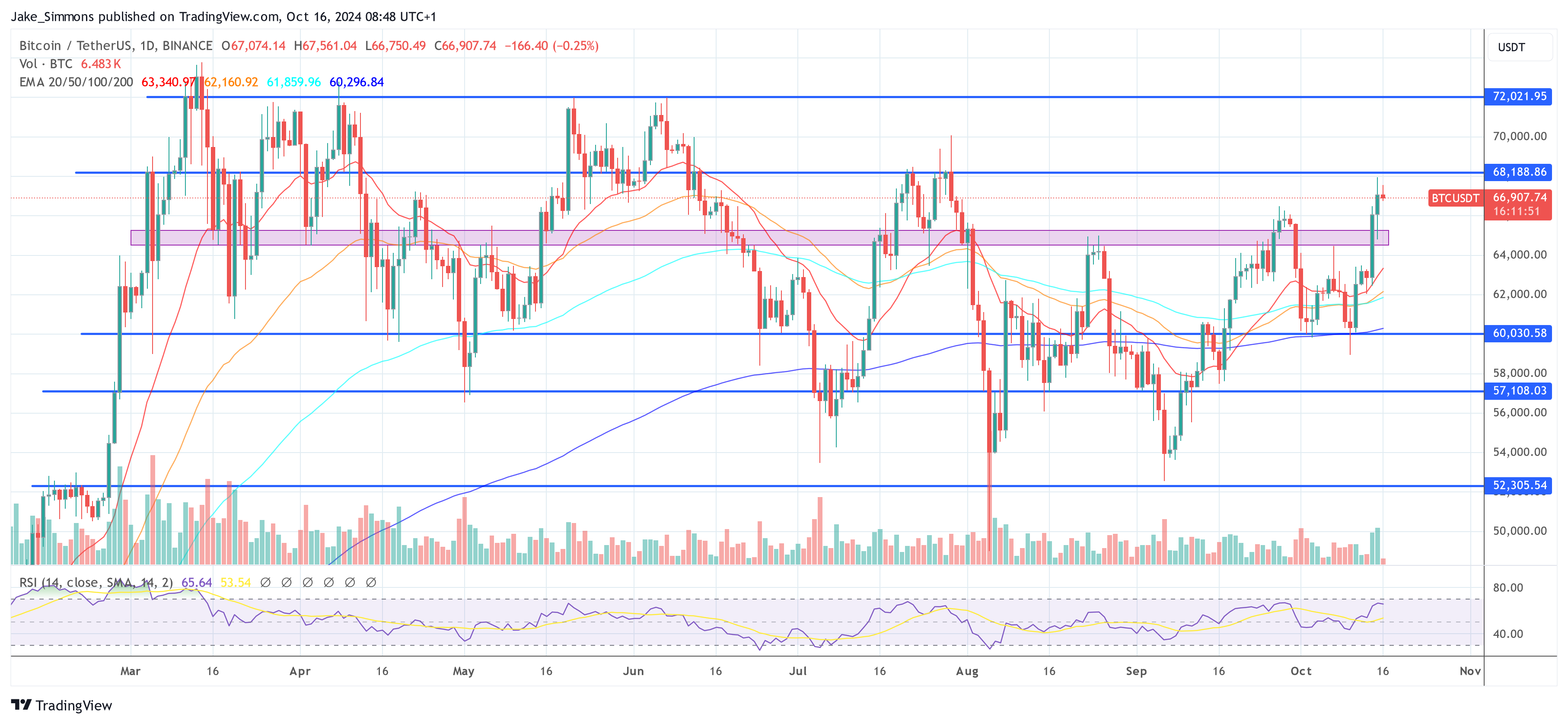Arthur Hayes, the co-founder and former CEO of BitMEX, published an essay titled “Persistent Weak Layer” on October 16, where he examines the potential impact of escalating tensions between Israel and Iran on the crypto markets. Drawing an analogy from avalanche science, Hayes explores how the geopolitical situation in the Middle East could act as a “persistent weak layer” (PWL) that might trigger significant financial market upheavals, affecting Bitcoin and crypto prices.
How Will The Crypto Market React?
Hayes begins the essay by recounting his recent skiing trip, stating. “One of the scariest conditions is a persistent weak layer (PWL), which could trigger a persistent slab avalanche when stressed. He parallels this to the Middle East’s geopolitical situation post-World War II, suggesting it serves as a PWL atop which the modern global order rests.
“The trigger usually has something to do with Israel,” Hayes observes. He emphasizes that the financial markets’ primary concern is how energy prices will respond, the impact on global supply chains, and the potential for a nuclear exchange if hostilities between Israel and another Middle Eastern nation, particularly Iran or its proxies, escalate.
Hayes outlines two scenarios. In the first, the Israel-Iran conflict fizzles into minor, tit-for-tat military actions. “Israel continues assassinating folks and decapitating dicks, and the Iranian response is telegraphed, non-threatening missile strikes,” he describes bluntly. No critical infrastructure is destroyed, and there are no nuclear strikes; thus, the PWL holds. In the second scenario, the conflict escalates dramatically, culminating in the destruction of Middle Eastern oil infrastructure, closure of the Straits of Hormuz, or a nuclear attack, leading to the PWL failing and causing an “avalanche in the financial markets.”
Expressing his concerns, Hayes states: “War is uninvestable, as they say.” He faces a strategic choice regarding his investment portfolio: whether to continue converting fiat currency into crypto or to reduce his crypto exposure in favor of cash or US Treasury bonds. “I don’t want to be under-allocated if this truly is the start of the next leg higher in the crypto bull market,” he explains. “Still, I also don’t want to incinerate capital if Bitcoin drops 50% in a day because Israel/Iran triggered a persistent slab financial markets’ avalanche. Forget about Bitcoin; it always bounces back; I’m more worried about some of the utter dogshit I have in my portfolio … meme coins.”
Buy Or Sell Now?
To navigate this dilemma, Hayes conducts a scenario analysis focusing on how the second, more severe scenario could impact crypto markets, particularly Bitcoin, which he refers to as the “crypto reserve asset.” He considers three primary risks: physical destruction of Bitcoin mining rigs, a dramatic rise in energy prices, and monetary implications resulting from the conflict.
Regarding the physical destruction of mining infrastructure, Hayes identifies Iran as the only Middle Eastern country with notable Bitcoin mining operations, accounting for up to 7% of the global hash rate. Reflecting on the 2021 scenario when China banned Bitcoin mining, he concludes that even the complete elimination of Iranian mining capacity would have negligible impact on the Bitcoin network and its price.
Addressing the risk of a dramatic rise in energy prices, Hayes considers the potential consequences if Iran retaliated by destroying major oil and natural gas fields or closing the Straits of Hormuz. Such actions would cause oil prices to spike, driving up energy costs globally. Hayes argues that this scenario would actually increase Bitcoin’s value in fiat terms. “Bitcoin is stored energy in digital form. Therefore, if energy prices rise, Bitcoin will be worth more in terms of fiat currency,” he explains.
He draws historical parallels to the 1970s oil shocks. During the Arab oil embargo of 1973 and the Iranian Revolution of 1979, oil prices surged significantly. “Oil rose 412%, and gold nearly matched its rise at 380%,” Hayes points out. He illustrates that while gold maintained its purchasing power relative to oil, stocks lost substantial value when measured against energy prices. Hayes suggests that Bitcoin, as a form of “hard money,” would similarly preserve its value or even appreciate relative to rising energy costs.
Lastly, Hayes examines the monetary implications, particularly how the United States might respond to the conflict financially. He emphasizes that US support for Israel involves providing weapons, funded through increased government borrowing rather than savings. “The US government purchases goods on credit and not from savings,” he highlights, referencing data that shows US national net savings are negative. He questions who will buy this debt and indicates that the Federal Reserve and the US commercial banking system would likely step in, effectively expanding their balance sheets and printing more money.
Hayes notes historical instances where negative national savings corresponded with sharp increases in the Federal Reserve’s balance sheet, such as after the 2008 Global Financial Crisis and during the COVID-19 pandemic. “The Fed and the US commercial banking system will buy this debt by printing money and growing their balance sheets,” he asserts. He suggests that this monetary inflation would significantly bolster Bitcoin’s price. “Bitcoin has outperformed the rise in the Fed’s balance sheet by 25,000%,” Hayes emphasizes, indicating Bitcoin’s strong performance relative to monetary base expansion.
However, he cautions investors about the potential for intense price volatility and uneven performance across different crypto assets. “Just because Bitcoin will rise over time doesn’t mean there won’t be intense price volatility, nor does it mean every shitcoin will share in the glory,” he warns.
Hayes reveals that he had invested in several meme coins but reduced those positions dramatically after Iran launched missile attacks. “When Iran launched its latest barrage of missiles at Israel, I cut those positions dramatically. My size was too big, given the unpredictability of how crypto assets will react to increased hostilities in the short term,” he admits. Currently, he holds only one meme coin, noting, “The only meme coin I own is the Church of Smoking Chicken Fish (symbol: SCF). R’amen.”
At press time, BTC traded at $66,907.















